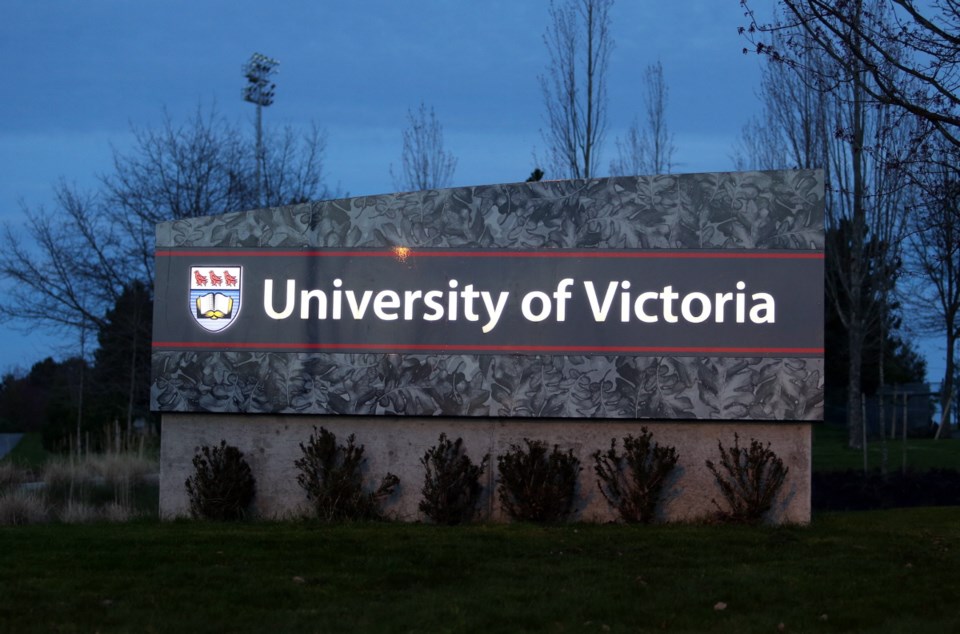Nattan Telmer figured out how to prolong the battery life of sea-lion tracking sensors from six weeks to a year — a boon to wildlife researchers.
He did this by using thermo-electric generators to create power from the heat difference between a sea lion and the water surrounding it. (I think.)
Nattan is in Grade 10 at Mount Doug.
Claremont Secondary’s Nicolas Fedrigo developed a robotic-assisted exoskeleton that can be fitted to the weakened hand of a stroke victim, speeding rehabilitation.
Zoe Dallas and Katie Timms of St. Margaret’s are designing a cheaper, smaller, smarter epi-pen. Delwyn Marcoux of G.P. Vanier in Courtenay is working on a better way to bring natural daylight into buildings through fibre optics.
Welcome to the 56th annual Vancouver Island Regional Science Fair, where 143 students just spent two days at UVic making you feel like a relative waste of space.
It turns out B.C. students are good at science. Really good. In December, our kids were ranked second in the world, behind only Singapore, in an assessment of the scientific literacy of 15-year-olds from 72 countries and all 10 provinces.
This is much to the annoyance of adults who A) like to think of young people as being like JPEGs, losing quality with each generation, and B) spent their own youth trying to carve a bong out of a potato. Great Scott but today’s students are bright. I half expected to see one of them hooking up a DeLorean to a flux capacitor at UVic.
Some of the very concepts at the science fair were hard to grasp, as fleeting as a dream. Annie McLeod made solar cells from dye extracted from three types of seaweed — a potential source of renewable energy. Her Glenlyon Norfolk schoolmate Melody Cheng went looking for evidence of a new phase of water. “The way I do that is I increase the temperature of water in different salinity, then I measure the contact angle,” the Grade 9 girl said.
I have absolutely no idea what that means (I may have given Melody the same uncomprehending stare my dog gave me when I tried to explain the NHL’s offside rule) but the sciency people seemed terribly excited about her work.
What sciency people are less excited about these days is what happens when their work collides with that of politicians.
Good science — hard, evidence-based, unemotional research — can make for inconvenient politics. Some people are less interested in the truth than in what Stephen Colbert calls “truthiness” — reality as, unencumbered by inconvenient evidence, they would like it to be. Truthiness allows us to leap to conclusions without tripping over facts.
The Harper Conservatives infamously muzzled federal scientists and dispensed with others, including those doing marine-pollution research from the Institute of Ocean Sciences at Patricia Bay. They closed science libraries, killed the National Round Table on the Environment and the Economy, cut funding to science-based agencies and collapsed the Office of the National Science Advisor, the independent voice who advised the prime minister on scientific questions. National Research Council funding had to be “business led and industry relevant” to the exclusion of other interests. Scientists engaged in environmental research were dragged outside by their ponytails and shot. (Just kidding. They shot them inside.)
Harper is gone but — just in time for the election — the Professional Employees Association, which represents B.C. government scientists, has released a survey showing that many of its members see trouble in their workplaces. About one third of 1,200 government scientists in 10 ministries replied to the survey conducted by a group called Evidence For Democracy.
One key finding: about half of those who replied “believe that political interference is compromising their ministry’s ability to develop laws, policies and programs based on scientific evidence.”
Most have seen declines in research capacity and think the cuts have left them without the ability to do their jobs.
They are also worried about government research and decision-making being outsourced to external professionals: “Scientists point to risks of conflicts of interest, which arise when these professionals are employed by the same industry the government is required to regulate,” the report read.
And then there’s Donald Trump, whose rise triggered the March for Science being held in cities around the world, including Victoria, on April 22.
Push them hard enough and scientists dig in their heels and say “no fair.”



